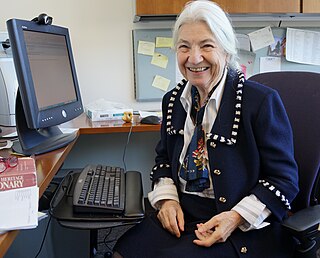Related Research Articles

Sir Charles Antony Richard Hoare is a British computer scientist who has made foundational contributions to programming languages, algorithms, operating systems, formal verification, and concurrent computing. His work earned him the Turing Award, usually regarded as the highest distinction in computer science, in 1980.

The Department of Computer Science at the University of Manchester is the longest established department of Computer Science in the United Kingdom and one of the largest. It is located in the Kilburn Building on the Oxford Road and currently has over 800 students taking a wide range of undergraduate and postgraduate courses and 60 full-time academic staff.

Jack Joseph Dongarra is an American computer scientist and mathematician. He is the American University Distinguished Professor of Computer Science in the Electrical Engineering and Computer Science Department at the University of Tennessee. He holds the position of a Distinguished Research Staff member in the Computer Science and Mathematics Division at Oak Ridge National Laboratory, Turing Fellowship in the School of Mathematics at the University of Manchester, and is an adjunct professor in the Computer Science Department at Rice University. He served as a faculty fellow at the Texas A&M University Institute for Advanced Study (2014–2018). Dongarra is the founding director of the Innovative Computing Laboratory at the University of Tennessee. He was the recipient of the Turing Award in 2021.

The Prototype Verification System (PVS) is a specification language integrated with support tools and an automated theorem prover, developed at the Computer Science Laboratory of SRI International in Menlo Park, California.
Clifford "Cliff" B. Jones is a British computer scientist, specializing in research into formal methods. He undertook a late DPhil at the Oxford University Computing Laboratory under Tony Hoare, awarded in 1981. Jones' thesis proposed an extension to Hoare logic for handling concurrent programs, rely/guarantee.

Gerard J. Holzmann is a Dutch-American computer scientist and researcher at Bell Labs and NASA, best known as the developer of the SPIN model checker.
Harlan D. Mills was Professor of Computer Science at the Florida Institute of Technology and founder of Software Engineering Technology, Inc. of Vero Beach, Florida. Mills' contributions to software engineering have had a profound and enduring effect on education and industrial practice. Since earning his Ph.D. in Mathematics at Iowa State University in 1952, Mills led a distinguished career.

Randal E. Bryant is an American computer scientist and academic noted for his research on formally verifying digital hardware and software. Bryant has been a faculty member at Carnegie Mellon University since 1984. He served as the Dean of the School of Computer Science (SCS) at Carnegie Mellon from 2004 to 2014. Dr. Bryant retired and became a Founders University Professor Emeritus on June 30th, 2020.
Elaine Jessica Weyuker is an ACM Fellow, an IEEE Fellow, and an AT&T Fellow at Bell Labs for research in software metrics and testing as well as elected to the National Academy of Engineering. She is the author of over 130 papers in journals and refereed conference proceedings.

Rajeev Alur is an American professor of computer science at the University of Pennsylvania who has made contributions to formal methods, programming languages, and automata theory, including notably the introduction of timed automata and nested words.

Ruzena Bajcsy is an American engineer and computer scientist who specializes in robotics. She is professor of electrical engineering and computer science at the University of California, Berkeley, where she is also director emerita of CITRIS.
Fred Barry Schneider is an American computer scientist, based at Cornell University, where he is the Samuel B. Eckert Professor of Computer Science. He has published in numerous areas including science policy, cybersecurity, and distributed systems. His research is in the area of concurrent and distributed systems for high-integrity and mission-critical applications.
Natarajan Shankar is a computer scientist working at SRI International in Menlo Park, California, where he leads the Symbolic Analysis Laboratory.

Marta Zofia Kwiatkowska is a Polish theoretical computer scientist based in the United Kingdom.
Patrick Denis Lincoln is an American computer scientist leading the Computer Science Laboratory (CSL) at SRI International. Educated at MIT and then Stanford, he joined SRI in 1989 and became director of the CSL around 1998. He previously held positions with ETA Systems, Los Alamos National Laboratory, and MCC.
Pamela Zave is an American computer scientist now working at Princeton University. She is known for her work on requirements engineering, telecommunication services, and protocol modeling and verification, and is now working on network architecture. She was named a Fellow of the Association for Computing Machinery in 2002, and was the 2017 recipient of the Harlan D. Mills Award from the IEEE Computer Society.
José Meseguer is a Spanish computer scientist, and professor at the University of Illinois at Urbana–Champaign. He leads the university's Formal Methods and Declarative Languages Laboratory.
Lionel Claude Briand, born in Paris, France, on November 21, 1965, is a software engineer, and professor at the University of Ottawa and University of Luxembourg. He is an IEEE Fellow, a Canada Research Chair in Intelligent Software Dependability and Compliance and a European Research Council Advanced grantee. His research foci are testing, verification, and validation of software systems; applying machine learning and evolutionary computation to software engineering; and software quality assurance, among others. He was vice-director of the University of Luxembourg's SnT - Interdisciplinary Centre for Security, Reliability and Trust from 2014 to 2019, and editor in chief of Empirical Software Engineering (Springer) from 2003 to 2016. In 2012, he was a recipient of the Harlan D. Mills Award.
References
- 1 2 3 "John Rushby Bio". Center for High Assurance Computer Systems, Information Technology Division, United States Naval Research Laboratory. Archived from the original on 2 July 2001. Retrieved 4 March 2012.
- ↑ Charles (15 June 2011). "ICSE 2011: John Rushby - Formal Methods, Verification and Some Computing History". Channel 9. Retrieved 12 March 2012.
- ↑ "John Rushby: 2011 Harlan D. Mills Award Recipient". IEEE Computer Society . Retrieved 4 March 2012.